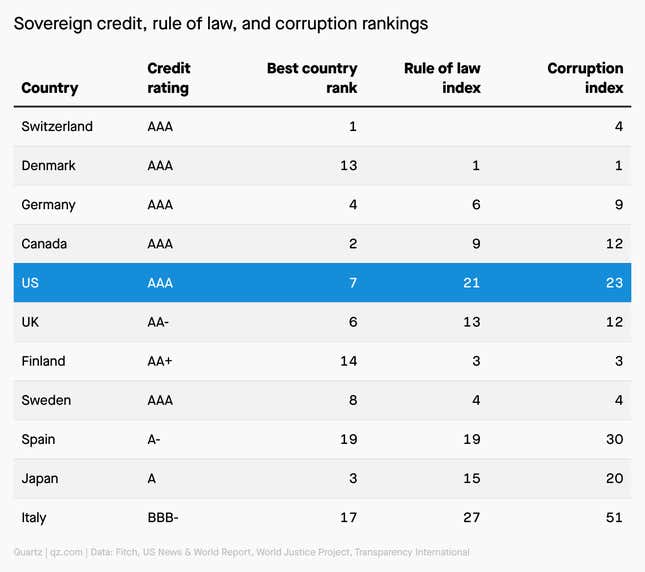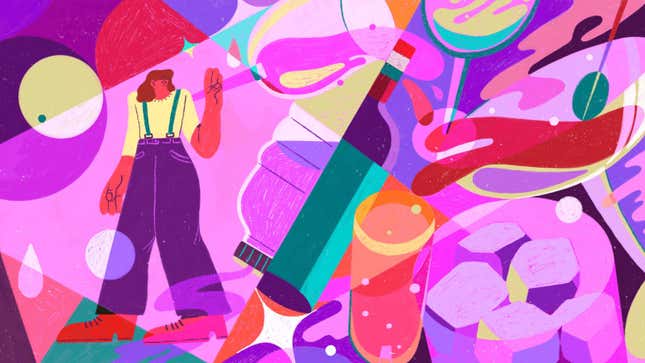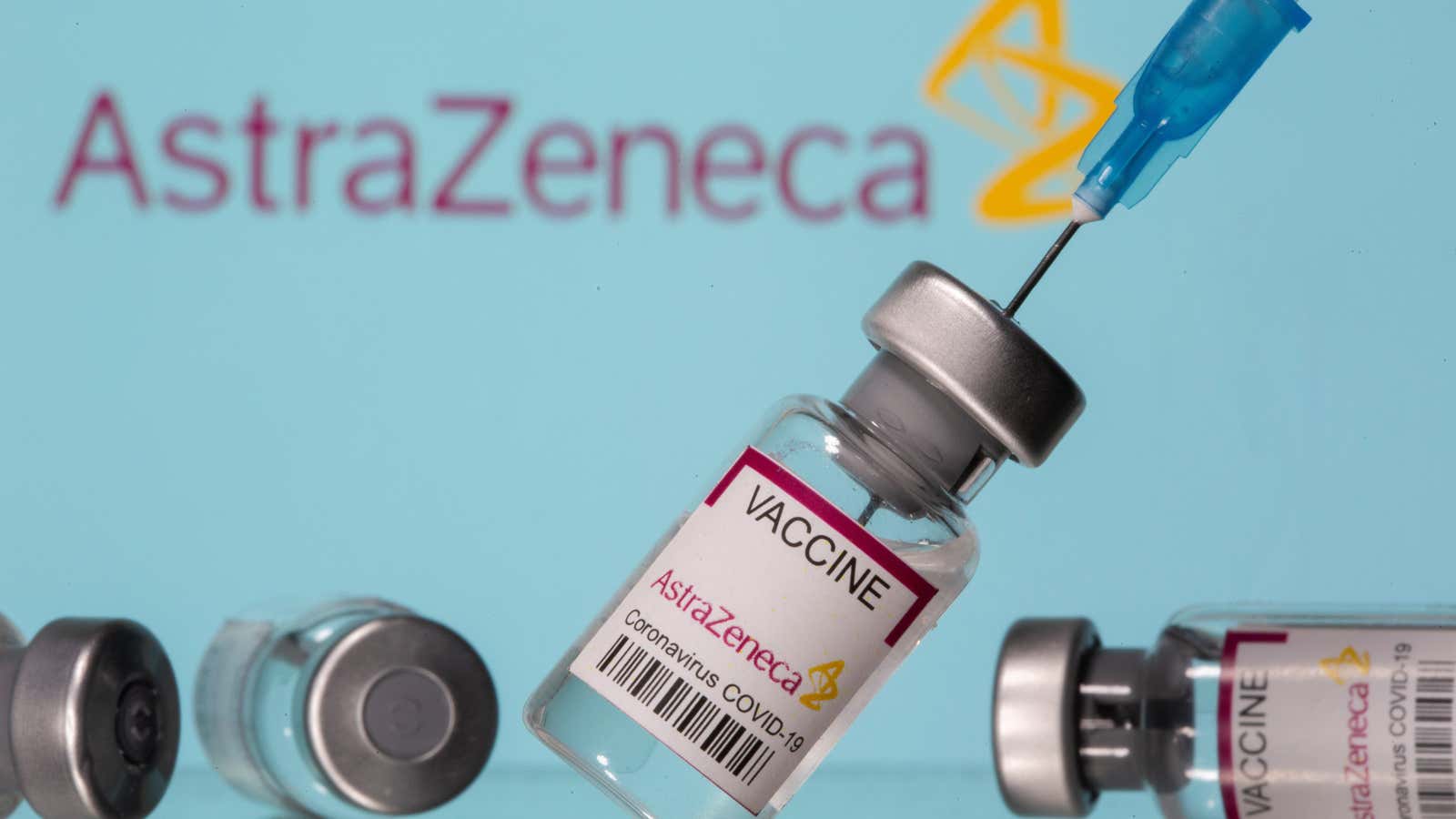Hello Quartz readers,
Yesterday, Germany, France, and Italy joined several other European and Asian countries in suspending distribution of the AstraZeneca/University of Oxford Covid-19 vaccine. Public health leaders called the pause “precautionary” after a very small number of people developed blood clots at some point after receiving their shots.
Health officials’ concerns are based on dozens of anecdotes, but more than 17 million people have received the AstraZeneca vaccine thus far. As of March 8, only 37 had subsequently developed blood clots. The European Medical Agency pointed out that this is actually fewer than medical experts would expect to see occur in the general population.
The World Health Organization is still conducting its own investigation of the vaccine, which will likely be concluded this week. In the meantime, Quartz’s Katherine Foley looked at everything we know about the AstraZeneca shot, and what we should expect from here.
Okay, let’s get started.
The wealth of nations
Since last autumn, South Africa, India, and 57 other nations have been pushing to temporarily lift World Trade Organization rules protecting intellectual property, a move that would allow developing economies to manufacture Covid-19 vaccines and other medical supplies without waiting for agreements with pharma companies that own the underlying IP. There’s just one problem: The wealthiest countries in the world—including the US, the EU, Canada, and the UK—are blocking the proposal.
Representatives of those nations say that freeing IP, even temporarily, could reduce incentives for corporate research, and critics of the proposal argue that big pharma companies can offer voluntary licenses to local manufacturers to fill gaps. The Biden administration has dodged taking a position, instead emphasizing its support of Covax, a global effort to manufacture vaccines for developing economies.
Proponents of the proposal say Covax is not enough on its own, and voluntary licenses often come with restrictions on where the products can be used. In one agreement between South African company Aspen and Johnson & Johnson to manufacture its single-dose vaccine, for example, just 9% of the supply will remain in South Africa.
Vaccine nationalism might be understandable for politicians who must answer to voters’ demands for life-saving interventions. But why does prioritizing corporate profits make sense when the speedy production of many coronavirus products, from test supplies to novel treatments and especially vaccines, has been driven by unprecedented public funding and global collaboration? International health organizations like Médecins Sans Frontières and Oxfam back the waiver proposal, and compare the coronavirus to other global health crises, like HIV-AIDS or polio, that required setting aside profit motives for the common good.
In the end, rich nations will sacrifice something one way or the other. One researcher estimated that the costs of vaccine inequality to the global economy could reach $9 trillion. And we know the pandemic won’t be truly defeated anywhere until it’s eradicated everywhere. —Tim Fernholz
Three dinner-table convos
🏦 Central banks: lender of last resort ✔️, financial regulator ✔️… affordable housing agency? The median house price in New Zealand soared past NZ$700,000 ($502,000) in the past year, after its central bank responded to the pandemic by cutting interest rates, leading to more available home credit. Now prime minister Jacinda Ardern has asked the Reserve Bank of New Zealand to consider the state of the housing market there as it makes policy decisions.
😷 “Mask diplomacy” is the new soft power. Being Chinese in Africa was the worst possible stigma for much of 2020: Africans vilified the Chinese, blaming them for the pandemic. China pointed the finger at Africans, too: Viral videos showed Chinese authorities forcibly evicting Africans from their homes. Beijing sought to improve its image in Africa by offering up vaccines, medical equipment, and personnel. That tactic has worked, and is further advancing China’s long-rising economic influence on the continent.
🇺🇸 Does the US still deserve its AAA credit rating? As its $28 trillion debt burden grows, the US is increasingly out of kilter with other AAA-rated nations like Germany, Australia, and Norway. The world’s largest economy can get away with splurging on so much debt because the US dollar is the main reserve currency, and there is a lot of faith in the greenback. But with US debt levels approaching 109% of GDP, will ratings companies continue to treat America as an exception?

You asked
When will we know if vaccines prevent transmission?
There are many reasons to think vaccinated people shouldn’t be able to pass on the virus, starting with the fact that vaccines have historically been instrumental in slowing the spread of infectious diseases. But in a field as complex as immunology, “shouldn’t” doesn’t cut it. In order to get to the bottom of the issue, scientists need to collect data from more observational studies following people who have been vaccinated—which obviously takes time. Fortunately, several of these studies are already underway.
“It’s a complicated statistical question,” says Luke Davis, an epidemiologist and pulmonologist at the Yale School of Public Health. “But provided there are the resources, I’d expect it’d be possible to get an answer in the next few months.”
Get shot American summer
Last week, US president Joe Biden said Americans could “mark our independence from this virus” by July 4, by which time there is a “good chance” vaccines could be administered to the 200 million US adults who have yet to receive them. In order to achieve that goal, the administration will have to ensure three things happen smoothly:
- More vaccines in the making. By now, the US has ordered enough supplies to give all adults at least one shot by the end of May.
- Streamlined registrations. Biden pledged to create an easy-to-use vaccine finder and toll-free telephone number to help people find the most convenient places to actually receive their shots.
- More vaccination stations. The administration plans to double the number of federally-run community vaccination sites, and will add 10,000 more pharmacies working with the federal government to distribute vaccines.
One important quote
“Lots of people—Black or not—have doubts about the vaccine and other public health information that is floating around. This is because we are seeing science play out in real time… [But] conflicting information means something very different for Black Americans. When not enough time has elapsed for experts to understand the full effects of the vaccines, but the expectation is that Black people fully trust that the vaccines are safe, it looks like history is repeating itself.” —Shenell Tolson, a molecular biologist, writes about why vaccination among Black Americans is so fraught, and how to address it thoughtfully
Bottoms down
A flood of books, podcasts, bars, and ready-made mocktails have emerged in recent years to support the idea that sober living can be fun. Demand for those offerings might even increase in a post-Covid world. “This pandemic has made us much more aware of the ways that we expose ourselves to risk,” the founder of one alcohol-free bar in Texas told Quartz. “I think that that whole experience is going to help us to examine where there’s risk elsewhere in our life.”
Here are some numbers to keep in mind.
6.4 liters: Global average amount of alcohol consumed per person in 2016
25%: Canadians aged 35-54 who say they started drinking more during the pandemic
14%: American adults who say the same
30%: Increase in sales of low- and no-alcohol beverages in the US and UK last year
57%: Percentage of the global population that hasn’t had a drink in 12 months
In this week’s guide for Quartz members, we look at how the new sobriety movement frames not drinking as a positive lifestyle choice—one anyone might make. Pour yourself a tall glass of knowledge by signing up for a seven-day free trial.

Recovery, but make it fashion
In China, fashion sales have been on the road to recovery for months, while the US is just starting to see signs of a turnaround. In Europe, though, the picture isn’t too rosy. “Our outlook for 2021 is particularly downbeat in Europe,” McKinsey and Business of Fashion warned in a recent joint report, predicting sales in the region could remain 12% to 24% below 2019 levels.
It’s not just about fewer Europeans spending money on clothes. Many stores in the region’s tourist capitals depend on traveling shoppers for sales, and the pandemic has wiped out tourism. When Gucci reported a slide in sales in its most recent quarter—even as its top luxury peers are on the mend—it blamed part of the weakness on its particular reliance on tourists.
Essential reading
- The latest 🌏 figures: 120.4 million confirmed cases; 68.3 million classified as “recovered;” 381 million vaccine doses administered.
- Made in India: A class divide is emerging in the world’s largest vaccination drive.
- Still loading: India’s seniors are navigating tech hurdles to get vaccinated.
- Still seeking immunity: A new ebola outbreak shows why we can’t get complacent.
- A better picture: The pandemic has prompted the most diverse Oscar nominations ever.
Our best wishes for a healthy day. Get in touch with us at needtoknow@qz.com, and live your best Quartz life by downloading our iOS app and becoming a member. Today’s newsletter was brought to you by Tim Fernholz, John Detrixhe, Dinko Hanaan Dinko, Katherine Foley, Shenell Tolson, Sarah Todd, Marc Bain, and Kira Bindrim.
